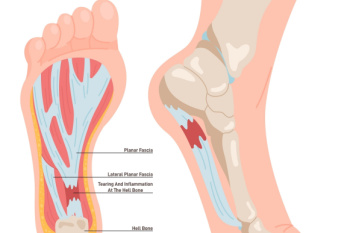
Plantar fasciitis is a common foot condition characterized by pain and inflammation in the plantar fascia, the thick band of tissue connecting the heel to the toes. This tissue supports the arch of the foot, but repetitive stress or strain can cause tiny tears, leading to irritation and discomfort. The hallmark symptom is sharp heel pain, especially noticeable with the first steps in the morning, or after periods of inactivity. People who are on their feet for long periods, have flat feet or high arches, or wear unsupportive footwear are more prone to developing plantar fasciitis. Treatment focuses on reducing inflammation and supporting the arch. Stretching exercises, custom orthotics, and anti-inflammatory medications are common approaches. Severe cases may benefit from targeted exercises, steroid injections, or, in rare instances, surgery. If you have heel pain, it is suggested that you visit a podiatrist for a proper diagnosis and treatment.
Plantar fasciitis is a common foot condition that is often caused by a strain injury. If you are experiencing heel pain or symptoms of plantar fasciitis, contact Emmanuel Bustos, DPM from New York. Our doctor can provide the care you need to keep you pain-free and on your feet.
What Is Plantar Fasciitis?
Plantar fasciitis is one of the most common causes of heel pain. The plantar fascia is a ligament that connects your heel to the front of your foot. When this ligament becomes inflamed, plantar fasciitis is the result. If you have plantar fasciitis you will have a stabbing pain that usually occurs with your first steps in the morning. As the day progresses and you walk around more, this pain will start to disappear, but it will return after long periods of standing or sitting.
What Causes Plantar Fasciitis?
- Excessive running
- Having high arches in your feet
- Other foot issues such as flat feet
- Pregnancy (due to the sudden weight gain)
- Being on your feet very often
There are some risk factors that may make you more likely to develop plantar fasciitis compared to others. The condition most commonly affects adults between the ages of 40 and 60. It also tends to affect people who are obese because the extra pounds result in extra stress being placed on the plantar fascia.
Prevention
- Take good care of your feet – Wear shoes that have good arch support and heel cushioning.
- Maintain a healthy weight
- If you are a runner, alternate running with other sports that won’t cause heel pain
There are a variety of treatment options available for plantar fasciitis along with the pain that accompanies it. Additionally, physical therapy is a very important component in the treatment process. It is important that you meet with your podiatrist to determine which treatment option is best for you.
If you have any questions, please feel free to contact our office located in New York, NY . We offer the newest diagnostic and treatment technologies for all your foot care needs.